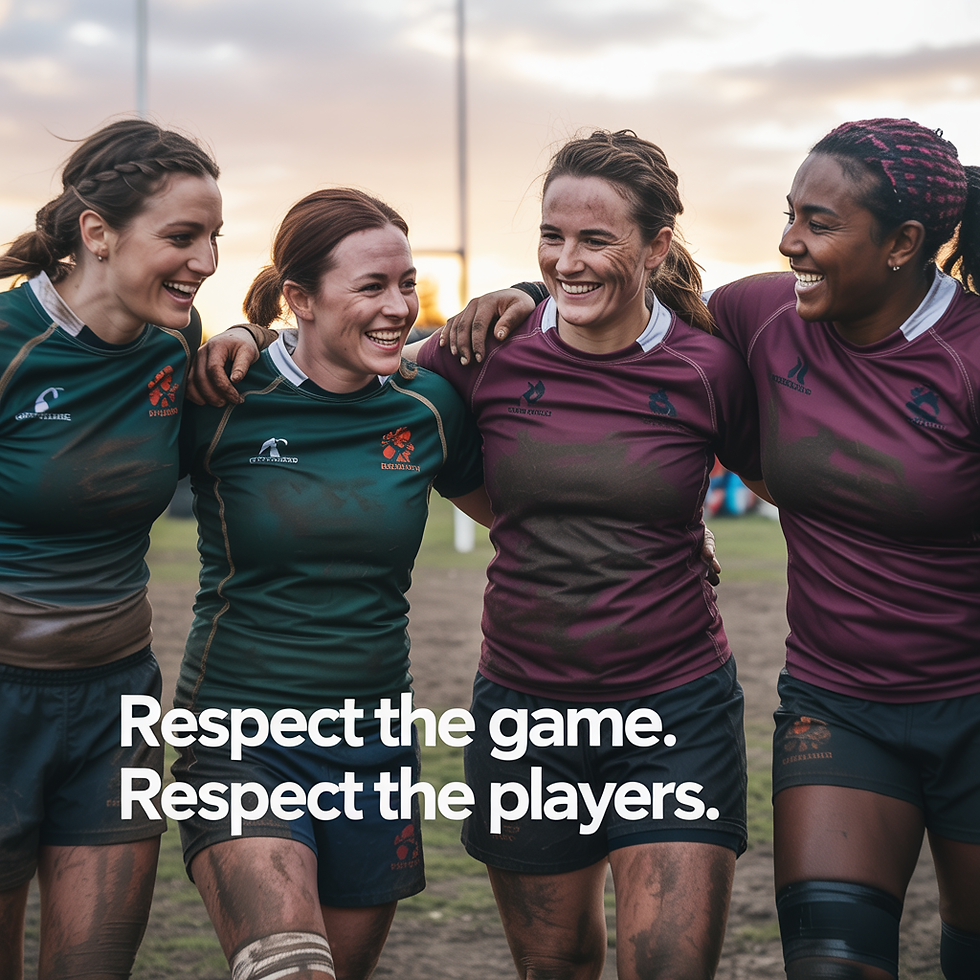Pass It On: Girl chat - why language matters in rugby.
- Erin Gilmour
- Jun 25, 2025
- 3 min read

Language Matters: Why "Girls" Isn't Appropriate for Adult Women in Rugby
We need to talk about something that happens at rugby clubs up and down the country. You'll hear it at committee meetings, in match reports, and in casual conversation around the clubhouse: adult women players being called "girls." Now, before anyone gets defensive, this isn't about having a go at well-meaning club members. Most of the time, it's completely unintentional. But that doesn't mean we shouldn't address it.
The Power of Language
Here's the thing about language – it shapes how we think, whether we realise it or not. When we consistently refer to adult women as "girls," we're unconsciously treating them as less than their adult male counterparts. And yes, that includes the unintended patronising tone that often comes with it – you know, that slightly condescending "aren't they sweet" attitude that creeps in when people talk about "the girls doing so well.".
What's Actually Happening
Walk into any grassroots rugby club and you'll hear it. Committee meetings where officials discuss "the girls' team budget" while talking about "the men's team" in the same breath. Match reports celebrating how "the girls played their hearts out" while the men's team gets described as "putting in a professional performance." Social media posts about "our girls" versus "our senior squad."
The frustrating part? Many of these officials genuinely support women's rugby. They turn up to matches, they fundraise, they put in the volunteer hours. But they're undermining their own efforts with language that comes across as belittling, even when that's the last thing they intend.
Why "Girls" Just Doesn't Work
Let's be honest about who we're talking about here. These aren't teenage players – they're adult women. Many are in their twenties, thirties, and beyond. They're juggling careers, mortgages, families, and serious training commitments. They've often been playing rugby for years, some are coaches themselves, and plenty are key figures in their clubs.
Calling them "girls" is infantilising, and it often comes with that unintentional tone that makes it sound like they're being praised for trying hard rather than being recognised for their actual achievements.
This reflects something we see everywhere, not just in rugby. Women often don't get the same linguistic markers of adulthood and authority that men do automatically. We've mostly figured this out in the workplace, but sport seems to be lagging behind.
The Real Impact
This language issue isn't just about hurt feelings – it has real effects. New female members notice when they're consistently referred to as "girls". It sends a message about how seriously their participation is taken, and potential sponsors pick up on it too.
It also affects younger players looking ahead to their future in the sport. What message does it send when even accomplished adult women players are still being called "girls" and spoken about in that well-meaning but patronising way?
Moving Forward
This doesn't need to be a big confrontational thing. Most club officials using this language are doing it without thinking, and they'd probably be horrified to realise they're coming across as this way. The fix is actually pretty straightforward.
Instead of "girls' team," try "women's team." Instead of "our girls," go with "our women players" or just "the team.". Talk to leadership members in your women’s teams and ask what language they prefer. Similarly, women, talk to your club committees.
The Bottom Line
Rugby clubs pride themselves on being welcoming, respectful places. Adult female rugby players aren't "girls" – they're women, athletes, and valued club members who deserve to be spoken about the same way we speak about everyone else.
Most people in rugby are decent, well-intentioned folks who want to do right by everyone at their club. This is just one more way to make sure our actions match our intentions. After all, if we can master the complexities of the scrum laws, we can probably manage to call adult women "women."







Comments